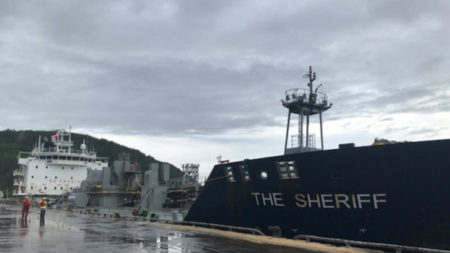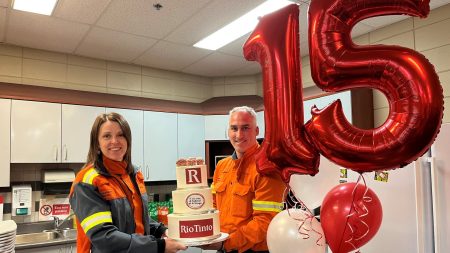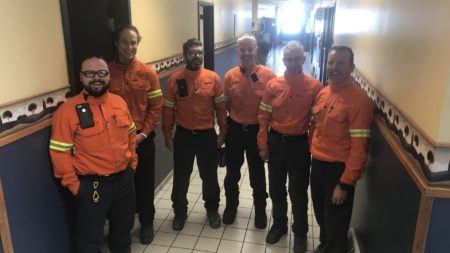Breakdown of the Jaeger Arrow: 10,000 Tonnes of Liquid Pitch Reach their Destination

The Jaeger Arrow is a ship that has been used to transport high-temperature liquid pitch for more than 20 years. This raw material goes into the manufacturing of anodes needed for aluminium production. Every month, the ship shuttles back and forth between Europe, where it is loaded, and Grande-Anse port, where it is unloaded.
On 13 October 2021, the Jaegar Arrow sustained a major breakdown. The repairs were expected to take one to two months, but the ship ended up being drydocked for nine months before becoming operational again, in June 2022. This situation caused major logistical challenges, but the teams were successful in finding solutions in the months following the breakage.
“We suddenly found ourselves without a boat to transport the liquid pitch to Alma Works and Arvida Works, where it’s needed. At the same time, we were dealing with a general shortage in North America affecting Grande-Baie Works. We set up a crisis cell with various Rio Tinto departments, including the marine department, which is responsible for booking ships for all raw materials, as well as with the plant process teams,” explained Serge Lalancette, Team Lead, Raw Materials.
Finding a replacement ship is not easy, so the difficulties lasted several months. “Ships aren’t easy to come by,” Lalancette added. “Ships for international transport are booked in advance, and those that can carry liquid pitch (generally called tankers) are even more scarce, as this product needs to be kept at a high temperature.”
There is another important factor to consider. “During the winter months, Saguenay freezes over,” Lalancette said. “So we need ships with ice class certification, meaning that they can travel through ice.”
On a few occasions, the silos at Grande-Anse port were at the minimum level, without this affecting the supply to the plants, however. “We were able to get smaller boats that could deliver 2,500 to 3,000 tonnes of pitch, the equivalent of a two- or three-week supply for Alma and Arvida,” continued Lalancette. “To deal with the logistical challenges, everyone involved had to be diligent, flexible and willing to collaborate. In February 2022, after another delay in repairing the Jaeger Arrow, we were able to sign an agreement with two Chinese suppliers to obtain 10,000 tonnes. This was a first, as liquid pitch normally comes from Europe.”
At this point, another challenge arose. “We had to find a ship to go to China for loading then deliver the product to Grande-Anse port. That’s quite a journey! Ship owners generally keep their ships in the same area, so it isn’t easy to find someone willing to break with their usual route. We had the pitch, but we needed to find a ship to bring it to its destination.”
Once the ship had been found (The Sheriff), the logistics of getting it to China had to be arranged. “We had to determine when it would be ready, when it would leave and when it would arrive,” said Lalancette. “We had to make accurate forecasts with regard to pitch consumption to ensure that the Grande-Anse silos would be able to hold the 10,000 tonnes that would be received once the ship arrived.”
The two silos at Grande-Anse port have a capacity of 10,000 tonnes—the very quantity of liquid pitch being transported by The Sheriff. Once the ship reached the destination, there had to be enough space to store the raw material.
The chosen solution involved completely emptying the silos at Grande-Anse in the weeks prior to the ship’s arrival and redistributing their contents to Alma Works, Grande-Baie Works and Arvida Works.
The 10,000 tonnes of pitch were finally delivered on 29 June, after a 42-day journey at sea. And now that the Jaegar Arrow is up and running again, the pace of operations has returned to normal.
Several people from different departments were involved in dealing with this complex issue—in particular in establishing the crisis cell. They include David Landry (Rio Tinto Marine), Captain Mladen Luketa, Grace Pizzuto (Rio Tinto Atlantic, Procurement), Jessica Verdini (Rio Tinto Australia and Shanghai, Procurement), Daniel Higginbottom (Land Transportation Logistics), Eric Richard (Regional Coordinator, Pitch) Pierre-Yves Brisson (Technical Supervisor, Carbon) and Claude Lavoie (General Manager, Carbon). We also acknowledge the tremendous collaboration and support of the employees of Fonbrai in Grande-Anse and Trois-Rivières and the supplier Rain CI.


